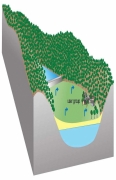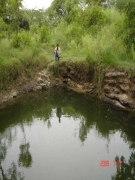/topics/equity
Equity
Analysis of the UN General Assembly's Resolution on Right to Water and Sanitation
Posted on 30 Sep, 2010 06:47 PMThe historic UN General Assembly Resolution declaring Water and Sanitation as a Right, was passed on the 28th July 2010.
What is surprising is the complete silence to this UN Resolution from some of the countries who have been traditional champions of human rights, in terms of celebrating it as a historic achievement in advocating a basic right to water and sanitation. Instead some of them went one step short of openly opposing and vetoing the UN Resolution and have heaped criticism on Bolivia for tabling this UN Resolution.
Field experiences by Avinash Krishnamurthy, BIOME Solutions
Posted on 29 Sep, 2010 11:04 AMOne of the oldest "People's electricity" systems I have ever seen (Please read the notes for each of the videos). Of course this trip had even better high points - wine made from Gooseberry and Nutmeg - all locally brewed. So travelling in the midst of hills, sipping local wine, seeing some great work, (and providing perspectives for someone-else to write - is this work or what?
Community organisation in groundwater management – A presentation by ACWADAM
Posted on 27 Aug, 2010 04:01 PM This presentation by ACWADAM on community organization in groundwater management deals with the processes involved in people’s mobilization and participation. The requisites of groundwater management include: resource enhancement, demand management, equitable distribution, institutional mechanism and controlling of free riding. It deals with groundwater management at a local scale when compared to aquifer management.
This presentation by ACWADAM on community organization in groundwater management deals with the processes involved in people’s mobilization and participation. The requisites of groundwater management include: resource enhancement, demand management, equitable distribution, institutional mechanism and controlling of free riding. It deals with groundwater management at a local scale when compared to aquifer management.
Aquifer management involves:
- Identification of aquifer on the basis of geology;
- Identification of recharge and discharge areas;
- Assessment of aquifer capacity and yield through aquifer mapping;
- Protection of recharge area and increasing the groundwater level through artificial recharge in recharge area (based on the geology);
- Treating groundwater as a common property resource;
- Encouraging community use of groundwater and restricting individual use;
- Putting in place an institutional mechanism and legal back up for community groundwater management;
- Awareness generation regarding groundwater and science of hydrogeology.
Pani Panchayat: A model of groundwater management – A presentation by ACWADAM
Posted on 25 Aug, 2010 08:20 AM The presentation by ACWADAM deals with Pani Panchayats as a model of groundwater management.
The presentation by ACWADAM deals with Pani Panchayats as a model of groundwater management.
Pani Panchayat is the name first given to a movement by Mr. Vilasrao Salunke for motivating farmers of Naigaon village of the drought-prone Purandhar taluka of Maharashtra in 1974. The government's inability to deal with the drought situation prompted him to take a 40 acre land on lease from the village temple trust and develop a recharge pond in the recharge area of the village, a dug well in the discharge zone and a lift irrigation system.
Farmers got impressed with the results demanding a scale up of the experiment leading to the setting up of Gram Gaurav Pratisthan (GGP) through which the work was expanded to encompass both groundwater and surface water management.
UN affirms the right to safe and clean drinking water
Posted on 02 Aug, 2010 02:56 PMA remarkable piece of water history should have been headline news everywhere this week.
National Rural Drinking Water Programme - Framework for implementation - MoRD (2010)
Posted on 02 Aug, 2010 01:46 AMThe Government of India launched the Accelerated Rural Water Supply Programme (ARWSP) in 1972-73 to ensure provision of adequate drinking water supply to the rural community through the Public Health Engineering System.
The second generation programme started with the launching of Technology Mission in 1986-87, renamed in 1991-92 as Rajiv Gandhi National Drinking Water Mission. Stress on water quality, appropriate technology intervention, human resource development support and other related activities were introduced in the rural water supply sector.
The third generation programme started in 1999-2000 when sector reform projects evolved to involve community in planning, implementation and management of drinking water related schemes, later scaled up as Swajaldhara in 2002.
The Rural Water Supply (RWS) sector has now entered the fourth phase with major emphasis on ensuring sustainability of water availability in terms of potability, adequacy, convenience, affordability and equity while also adopting decentralized approach involving PRIs and community organizations.
Environmental flows: Free-flowing rivers around the world
Posted on 30 Jul, 2010 11:56 AMThis is the first in a new series of articles that IWP will host on various aspects of Environmental Flows. We welcome your comments and original articles for this series, please mail us at portal@arghyam.org
The other side of the story: Free-flowing rivers around the world
With around 5100 large dams, India ranks third in the world with regards to the number of large dams. The ongoing debate over the economic, social and environmental costs of large dams has indicated many times that these costs are not commensurate with their benefits. Although we have dammed all our major rivers, (except Brahmaputra and plans to dam its major tributaries are on way, some like Ranganadi have already been dammed), profoundly changing their hydrological, ecological, social and cultural systems, we are yet to form a policy which states that environmental flows in rivers are a necessity. It is more than clear now that environmental flows relate to well being of not only ‘birds and fishes’, but also of the entire human society . Take an example of fisheries, lack of flows in rivers and contractor-owned reservoir fishing has affected the livelihood of hundreds of thousands of small fishermen . Environmental flows also dilute pollution load, so let us not hide behind the fact that pollution is wiping out our riverine fish, not the absence of flows. It is also clear that environmental flows do NOT mean a decommissioning of all the present dams, nor do they mean any random figure like 60% or 10% of MAR . Eflows require reaching a wise compromise through science and local negotiations, for each river.
While many countries have put in place policies and laws for maintaining environmental flows in their rivers, there is also a rarer category: Rivers which have not been dammed yet, rivers which retain their connection from the source to the sea, nurturing myriad ecosystems and communities in their wake! These are known by many names like Free flowing rivers, Wild Rivers, Pristine/ Virgin rivers, Heritage Rivers, etc., each indicating their rare character and value. In ecological and cultural terms, the value of these rivers is immense and as more and more rivers are being dammed the world over, this value is increasing steeply. Unfortunately, in today’s economic terms, these rivers are still waiting to get their due recognition, but as human systems evolve, they will surely be seen as ‘invaluable’ service providers with phenomenal use and non use values.
Dr. G. D. Agrawal , the scientist, environmentalist and rishi
Posted on 27 Jul, 2010 03:52 PMDr. G. D. Agrawal Scientist and Rishi
Meeting Dr. G. D. Agrawal in his spartan, two room cottage in Chitrakoot, Madhya Pradesh, you would never guess what an accomplished and distinguished scientist he is – first Member-Secretary of the Government of India’s Central Pollution Control Board, former Head of the Department of Civil and Environmental Engineering at IIT Kanpur and a PhD from the University of California, Berkeley. The list goes on and on.
Yet this eminent professional sweeps his own floors, washes his own clothes and cooks his own meals. He retains only a few possessions and dresses in homespun khadi. At the age of 76, his main mode of transport within Chitrakoot is a bicycle and when he travels further afield, he goes by ordinary bus and second-class train. These are the deliberate choices of a devout Hindu whose deepest values are for simplicity and reverence for nature. Dr G.D. Agrawal is the doyen of environmental engineering professionals in India. Well past retirement, he continues to teach and inspire students as an Honorary Professor of Environmental Sciences at the Mahatma Gandhi Chitrakoot Gramodaya Vishwavidyalaya, in Chitrakoot (M.P.).
5th Global YES Summit, Rework The World - A trip report
Posted on 26 Jul, 2010 11:17 PMHad the opportunity to attend a recent worldwide gathering on the topic of youth and social entrepreneurship, which gave much food for thought. The event was the 5th Global YES Summit, entitled “ReWork The World”. Details of the gathering are at www.reworktheworld.org . The message there was that we need to do something radical in order to find productive work for the vast numbers of youth coming into the workforce especially in developing nations. The new jobs cannot be of the old variety, they need to be green, sustainable jobs. In other words, we need to ‘rework the world’. The conference was based on the premise that these new jobs will come out of social entrepreneurship.




